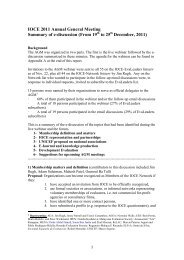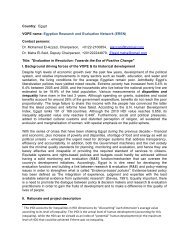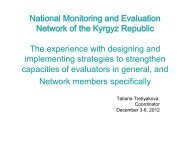12 Sandy TautFrom a more general po<strong>in</strong>t of view, we could expla<strong>in</strong> these cultural differences <strong>in</strong> the roleof professional standards us<strong>in</strong>g cultural dimensions and concepts. For example, one could arguethat high-conservatism societies tend to not use <strong>Standards</strong>. In those cultures, the emphasis on thema<strong>in</strong>tenance of the status quo keeps people from engag<strong>in</strong>g <strong>in</strong> behavior that might disrupt thegroup solidarity(<strong>in</strong> this case the group of evaluators). <strong>The</strong> same may be true for collectivistcultures. In those cultures, a “socially-oriented achievement motivation” (Berry et al., 1997, Vol.3, p. 25) might prevent <strong>in</strong>dividual accountability on the basis of <strong>Standards</strong> to be valued. Incultures with strong <strong>in</strong>groups, “group achievement rather than <strong>in</strong>dividual expertise is valued”(Rohlen, 1979, <strong>in</strong>: Berry et al., 1997, Vol. 3, p. 380). In countries with “Confucian work ethics”(<strong>The</strong> Ch<strong>in</strong>ese Culture Connection, 1987, <strong>in</strong>: Berry et al., 1997, Vol. 3, p. 373), work is “a moralduty to the collectivity.”In addition, for example, <strong>in</strong> Ch<strong>in</strong>a (Chen & Uttal, 1988, <strong>in</strong>: Berry et al., 1997, Vol. 3, p.139), “effort is regarded as more important than ability <strong>in</strong> expla<strong>in</strong><strong>in</strong>g academic outcomes than <strong>in</strong>the United States.” Extrapolated to the professional context, accountability based on <strong>Standards</strong>of proper conduct seems difficult. Also, <strong>in</strong> certa<strong>in</strong> cultures, the motivation of people to performis lower than <strong>in</strong> others. For example, an underly<strong>in</strong>g assumption of Organizational Developmentis that the organizational members have the motivation “‘to make […] a higher level ofcontribution to the atta<strong>in</strong>ment of organizational goals […].’ [French & Bell, 1990, p. 44]Probably this assumption does not hold true <strong>in</strong> many develop<strong>in</strong>g countries” (<strong>in</strong>: Berry et al.,1997, Vol. 3, p. 394).One should also take <strong>in</strong>to account current and future developments <strong>in</strong> <strong>Evaluation</strong> acrossthe world. As more <strong>in</strong>digenous evaluators are be<strong>in</strong>g tra<strong>in</strong>ed <strong>in</strong> western sett<strong>in</strong>gs or by westernevaluators, the <strong>Standards</strong> will probably become more widespread even <strong>in</strong> cultures where theiruse would not come about without such foreign <strong>in</strong>fluence. Additional dissem<strong>in</strong>ation might, ofcourse, come from those western evaluators engaged <strong>in</strong> evaluations <strong>in</strong> foreign cultural sett<strong>in</strong>gs.Even though, <strong>in</strong> some cultures, evaluators do not and will not rely on <strong>Standards</strong> for judg<strong>in</strong>gprofessional performance, the <strong>Standards</strong> can still provide helpful ideas on important aspects ofwhat good evaluations should look like. However, even these ideas need to be relevant to thespecific cultural backgrounds and values, mak<strong>in</strong>g an analysis of their cross-culturaltransferability a sensible task.A Values-Based Analysis of the <strong>Standards</strong>’ Cross-Cultural TransferabilityFor exam<strong>in</strong><strong>in</strong>g the <strong>Standards</strong>’ transferability to other cultures, it is important to analyzethe <strong>Evaluation</strong> <strong>Standards</strong> regard<strong>in</strong>g the North American values they reflect, as represented by theJo<strong>in</strong>t Committee members. Values have a vary<strong>in</strong>g degree of generality across cultures. Likevalues, we consider some of the <strong>Standards</strong> as be<strong>in</strong>g universal. <strong>The</strong>se <strong>Standards</strong> (e.g., PracticalProcedures) need no further discussion from a cross-cultural po<strong>in</strong>t of view. Yet other <strong>Standards</strong>(e.g. Rights of Human Subjects) are unique to North American culture and lack transferability toother cultures.
Cross-Cultural Transferability of the <strong>Program</strong> <strong>Evaluation</strong> <strong>Standards</strong> 13What values or value dimensions are reflected <strong>in</strong> the <strong>Standards</strong> and how do these valuesdiffer across cultures? Which are valid <strong>Standards</strong> for evaluators <strong>in</strong> all cultures, and which<strong>Standards</strong> perta<strong>in</strong> to goals of conduct that do not apply <strong>in</strong> cultures different from the NorthAmerican culture?In exam<strong>in</strong><strong>in</strong>g the <strong>Standards</strong>, the complexity of the analysis was restricted by omitt<strong>in</strong>g todiscuss the <strong>in</strong>terdependencies among the <strong>Standards</strong>. By def<strong>in</strong>ition, focus<strong>in</strong>g on one Standard willsometimes mean neglect<strong>in</strong>g another (trade-off, see Stufflebeam, 1986, pp. 10; Jo<strong>in</strong>t Committee,1994, p. 9); some <strong>Standards</strong> form an entity <strong>in</strong> the evaluation process. In addition, as mentionedabove, the Jo<strong>in</strong>t Committee (1994) stresses that the <strong>Standards</strong> are not rigid pr<strong>in</strong>ciples. <strong>The</strong>analysis presented <strong>in</strong> this paper can neither account for all possible situations and cases <strong>in</strong> whichthe <strong>Standards</strong> are used, nor the different ways <strong>in</strong> which they are applied by different evaluators.<strong>The</strong>ir negotiability ameliorates their transferability to other cultural contexts. However, theirnegotiability does not compensate for their reflection of values specific to their orig<strong>in</strong>. Inaddition, an analysis deal<strong>in</strong>g with cultural values is necessarily oriented to ‘ma<strong>in</strong>stream’ values.Societal values are always arranged along a cont<strong>in</strong>uum, some people be<strong>in</strong>g closer to one end,some closer to the other; but the majority will be found <strong>in</strong> the middle. <strong>The</strong> <strong>in</strong>terpretation and useof the <strong>Standards</strong> also occurs along a cont<strong>in</strong>uum which is affected by the evaluator's expertise andvalues and the current context of the evaluation (with<strong>in</strong> a culture). But some degree ofsimplification is necessary to ensure the clarity of the analysis. We concede that the follow<strong>in</strong>ganalysis is based on subjective <strong>in</strong>terpretation of the <strong>Standards</strong> as they appear <strong>in</strong> the secondedition, with all the above mentioned restrictions.A f<strong>in</strong>al remark is dedicated to the ‘Guidel<strong>in</strong>es’ and ‘Common Errors’ sections <strong>in</strong> the<strong>Standards</strong> (Jo<strong>in</strong>t Committee, 1994). We are aware that they were designed as proceduralsuggestions based on the experiences of North American evaluators – they are not <strong>in</strong>tended asgeneral pr<strong>in</strong>ciples applicable <strong>in</strong> any situation (even less than the <strong>Standards</strong> themselves).Nevertheless, some of the observations made when read<strong>in</strong>g these sections through the ‘crossculturallens’ are <strong>in</strong>cluded s<strong>in</strong>ce these remarks might help the reader <strong>in</strong> understand<strong>in</strong>g the valuedimensions that were identified and might also heighten the reader’s awareness regard<strong>in</strong>gcultural <strong>in</strong>fluences dur<strong>in</strong>g the evaluation process.Utility <strong>Standards</strong>U1 Stakeholder Identification Persons <strong>in</strong>volved <strong>in</strong> or affected by theevaluation should be identified, so that their needs can be addressed.<strong>The</strong> 'Stakeholder' concept is of central importance throughout the <strong>Evaluation</strong> <strong>Standards</strong>(it is part of almost all <strong>Standards</strong>), and it is most explicit <strong>in</strong> the Utility Standard U1, StakeholderIdentification. This concept is closely tied to the Hierarchy-Egalitarianism cultural dimension.For example, the <strong>in</strong>clusion of all significant stakeholders <strong>in</strong> the evaluation process is a desirableand legitimate goal <strong>in</strong> Western democratic societies, like the United States, that have anegalitarian understand<strong>in</strong>g of society. In other cultures, people view the unequal distribution of
- Page 1 and 2: The Program Evaluation Standardsin
- Page 3 and 4: The editor acknowledges the valuabl
- Page 5 and 6: ForewordOn February 18-20, 2000, th
- Page 7 and 8: Hopefully, this volume will contrib
- Page 9 and 10: 5Cross-Cultural Transferabilityof T
- Page 11 and 12: Cross-Cultural Transferability of t
- Page 13 and 14: Cross-Cultural Transferability of t
- Page 15: Cross-Cultural Transferability of t
- Page 19 and 20: Cross-Cultural Transferability of t
- Page 21 and 22: Cross-Cultural Transferability of t
- Page 23 and 24: Cross-Cultural Transferability of t
- Page 25 and 26: Cross-Cultural Transferability of t
- Page 27 and 28: Cross-Cultural Transferability of t
- Page 29 and 30: Cross-Cultural Transferability of t
- Page 31: Cross-Cultural Transferability of t
- Page 34 and 35: 30 Nick L. Smith, Saviour Chircop a
- Page 36 and 37: 32 Nick L. Smith, Saviour Chircop a
- Page 38 and 39: 34 Nick L. Smith, Saviour Chircop a
- Page 40 and 41: 36 Nick L. Smith, Saviour Chircop a
- Page 42 and 43: 38 Nick L. Smith, Saviour Chircop a
- Page 44 and 45: 40 Nick L. Smith, Saviour Chircop a
- Page 46 and 47: 42 Soojung Jangyears. Due to the sc
- Page 48 and 49: 44 Soojung JangThis test-based sele
- Page 50 and 51: 46 Soojung JangTable 1. Descriptive
- Page 52 and 53: 48 Soojung JangU2 Evaluator Credibi
- Page 54 and 55: 50 Soojung Janggenerous to foreigne
- Page 56 and 57: 52 Soojung Jangfeelings. This partl
- Page 58 and 59: 54 Soojung JangReporting Informatio
- Page 60 and 61: 56 Soojung JangU4 Values Identifica
- Page 62 and 63: 58 Soojung JangReferencesBecker, C.
- Page 64 and 65: 60Standards for Evaluation:On the W
- Page 66 and 67:
62 Wolfgang BeywlThe advantage of t
- Page 68 and 69:
64 Wolfgang BeywlA more direct way
- Page 71 and 72:
67Evaluating Evaluations: Does the
- Page 73 and 74:
Evaluating Evaluations 69Bussmann 1
- Page 75 and 76:
Evaluating Evaluations 71• Housin
- Page 77 and 78:
Evaluating Evaluations 73Table 1: C
- Page 79 and 80:
Evaluating Evaluations 75• Contra
- Page 81 and 82:
Evaluating Evaluations 77References
- Page 83 and 84:
Evaluating Evaluations 79Raven, J.
- Page 85 and 86:
81Evaluation StandardsRecommended b
- Page 87 and 88:
Evaluation Standard Recommended by
- Page 89 and 90:
Evaluation Standard Recommended by
- Page 91 and 92:
Evaluation Standard Recommended by
- Page 93 and 94:
Evaluation Standard Recommended by
- Page 95 and 96:
Evaluation Standard Recommended by
- Page 97 and 98:
Evaluation Standard Recommended by
- Page 99 and 100:
Evaluation Standard Recommended by
- Page 101 and 102:
Evaluation Standard Recommended by
- Page 103 and 104:
Evaluation Standard Recommended by
- Page 105 and 106:
Evaluation Standard Recommended by
- Page 107 and 108:
103AnnexThe complete list of the or
- Page 109:
Annex 105A4 Defensible Information






